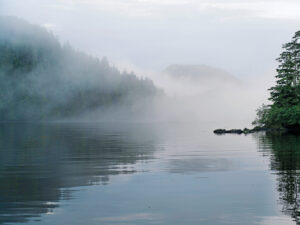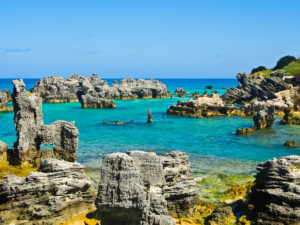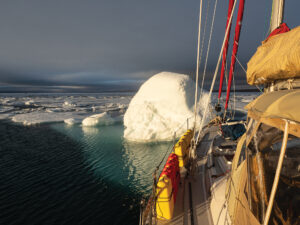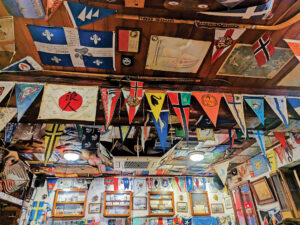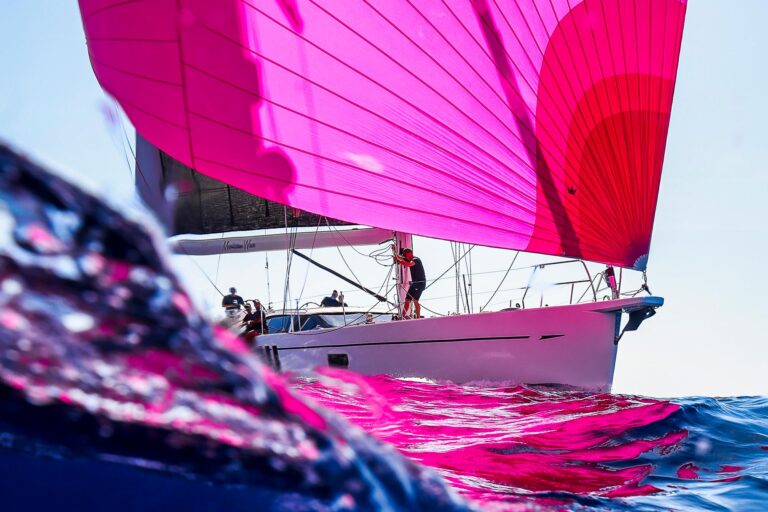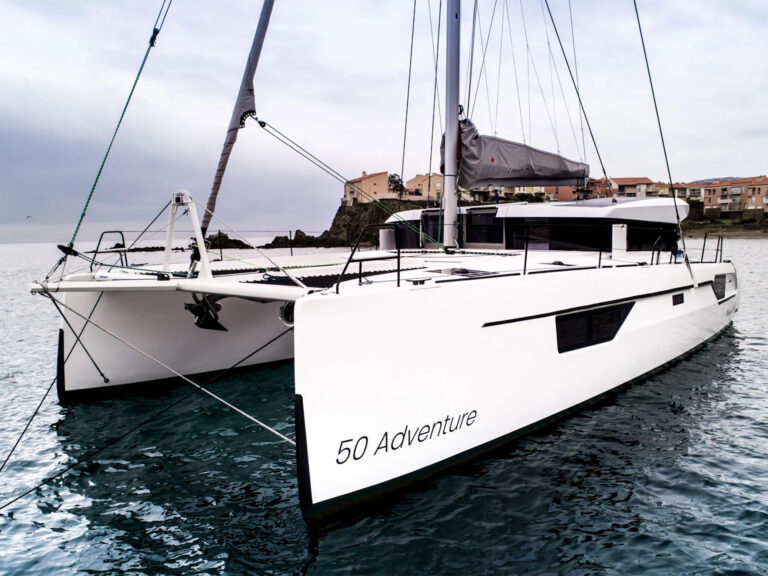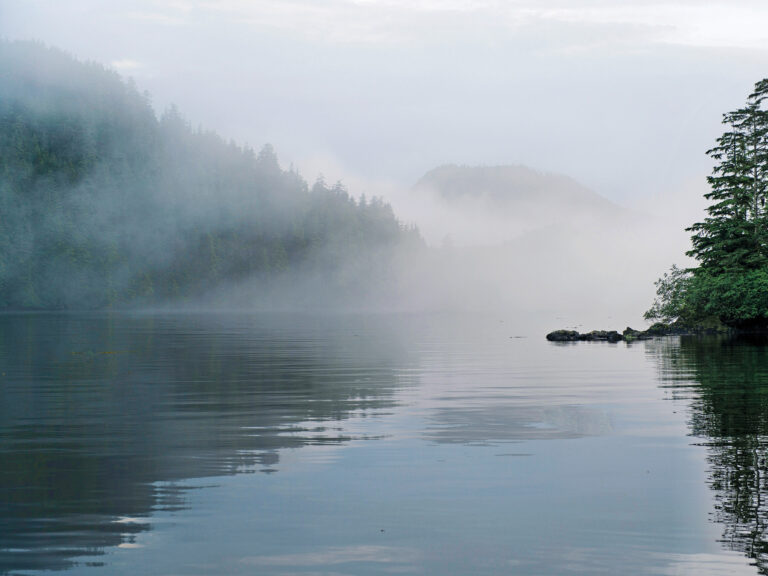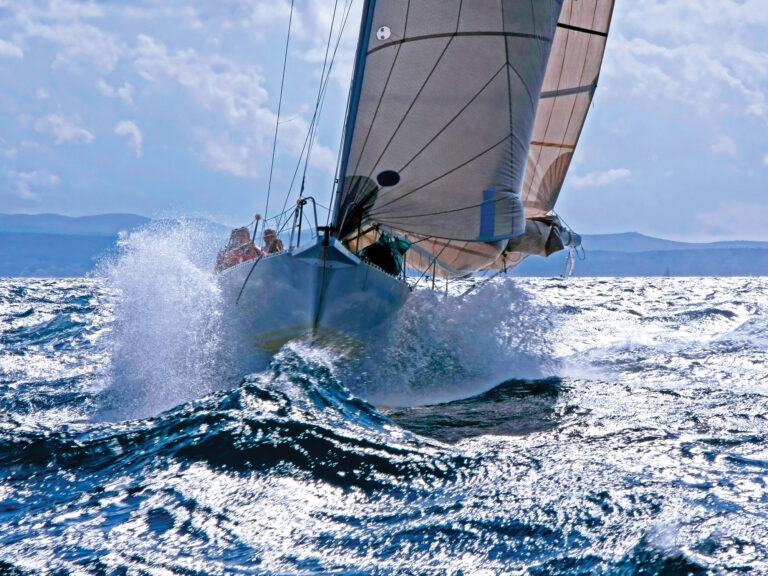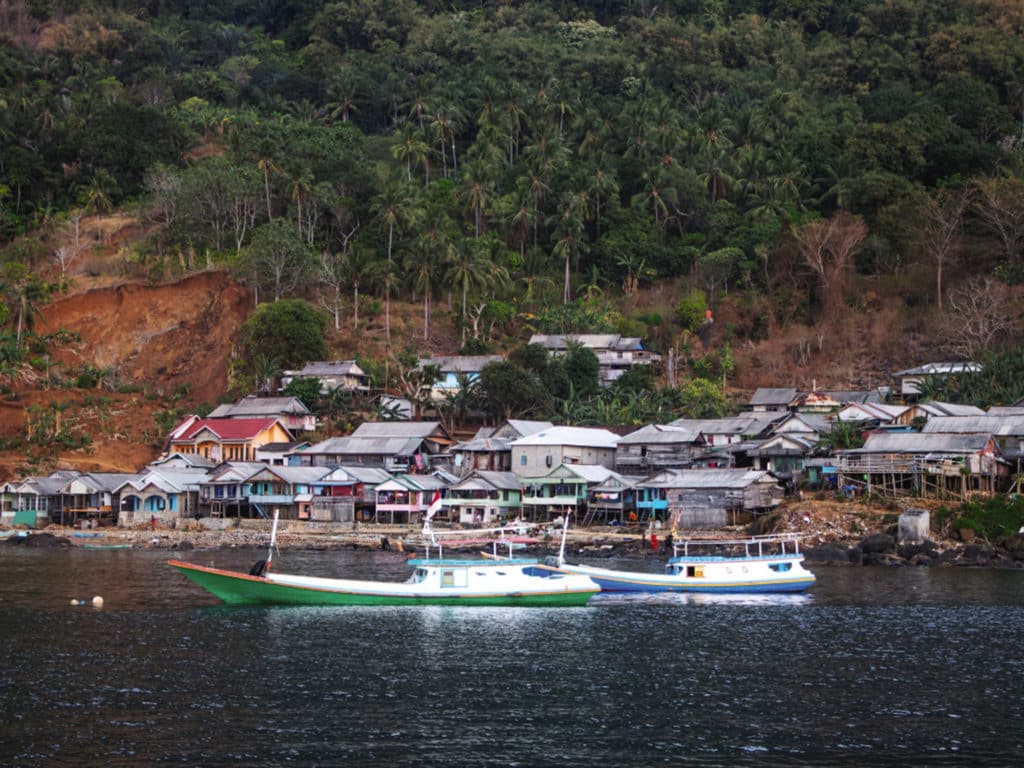
You can’t sail away your whole life!” I’ve heard that more than once, and at age 68—with 60 of those years spent afloat—I’m not sure that it’s true. Is bean counting ashore that much better? That much more fulfilling? Is having a loyalty card at Starbucks truly the end-all of workaday modernity? One thing that such chiding illustrates is the land-centricity of the speaker. I, however, am a sailor. I’m not sailing away from their concrete jungle; I’m sailing toward my own private Nirvana Bay.
One of the ways my wife, Carolyn, and I do this is by shunning ease. I know that sounds like a worse blasphemy than being against generosity! But bear with me and allow me a second to unroll the dusty chart of an alternative view. We recently cruised many of the 17,508 islands of Indonesia for four months with a totally different objective than most: We sought out cruising inconvenience.
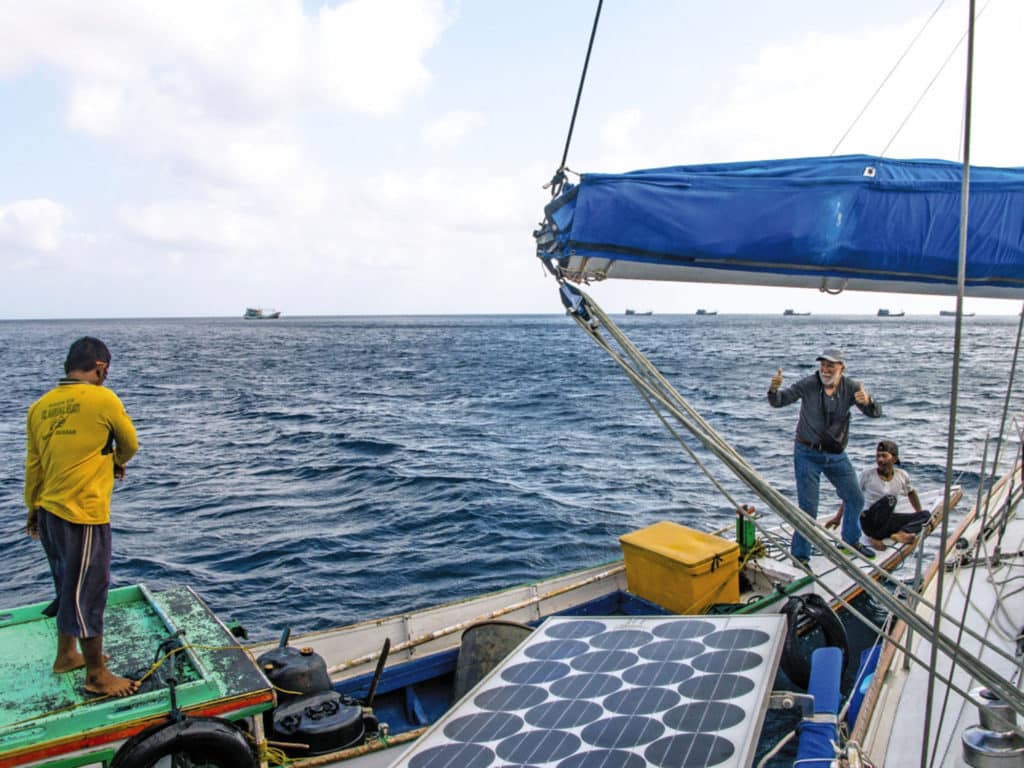
Please don’t misunderstand—we have spent years in Florida, the Gulf of Mexico, the Bahamas, Virgin Islands and Lesser Antilles, not to mention the Med, the Pacific and New Zealand. We know what sailing into a crowded bay with all the water toys feels like. We’re just a bit jaded. We need a new thrill. We no longer want to step into a tourist brochure; we want to leap out of one.
Sailors can still do this, perhaps even for another decade or two. But the window of opportunity is closing, perhaps forever.
In Indonesia, we looked for isolated, small island communities without an airport or commercial port. All the better if there was no power or transportation grid. Any section of planet Earth that doesn’t kowtow to the automobile is relaxing. Also, no internet. And the icing on the cake: no harbor whatsoever. How do you safely anchor without a harbor? Easy—you drop the hook in the lee of an isle in the trade winds, with the breeze pushing you offshore. You either remain in place or you get blown out to the safety of the sea. What’s the big deal?
In such a spot, is there a harbormaster who will guarantee you a good night’s sleep? No, thankfully, there is not. By design, more than half the stops we made in Indonesia fit into this sans-harbor, -road or -airport category, with Pulau Matasirih in the Laut Kecil Islands being our favorite.
Actually, this community exceeded our expectations by having only footpaths and no pier, not even a dinghy dock or floating pontoon to facilitate coming ashore. (There was a dock on the other side of the island, many hours away by foot.)
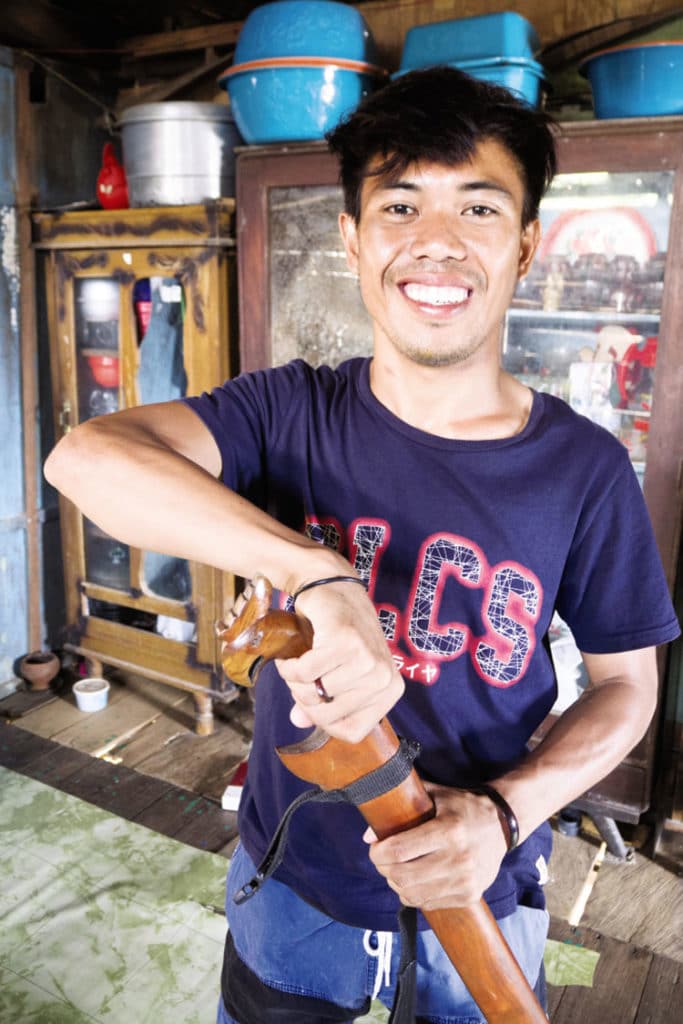
Is such a destination a lot of work? It is. But your sweat buys you something unique: Nobody tries to sell you anything on any level; you’re a human, not a dollar sign.
In today’s commercial world a-go-go, to sail into a community without oversaturated video screens loudly blaring commercials touting the freedom of credit cards—that’s priceless.
Of course, not only did Ganesh, our 43-foot ketch, have to have good ground tackle intelligently deployed, so did our 12-foot Caribe dinghy. I not only had to get my wife, Carolyn, ashore, but I also had to leave the dinghy so it would not destroy itself on the sharp rocks in the frothing surf.
To say that our appearance created a sensation is an understatement. Waves of running children followed us down the coast as I attempted to find a safe place to scramble ashore. Later, the town fathers told us that they’d seen a number of sailboats over the years, and about five years ago, a two-master had sailed down their lee. But we were the first yachties ever to come ashore.
Do we think we’re like James Cook or Magellan? Not at all. We merely have found, over the decades, that we prefer cruising places like Indonesia more than standing in line to ride the Pirates of the Caribbean attraction at Disney World. Does that make us weird? I hope not. Life is to be lived, not passively watched.
As we stepped ashore on Matasirih, I carried a bundle of used guitar strings I’d collected from Western musicians; Carolyn carried consumable school supplies we’d purchased in bulk. Soon, we split up. I found the local pickers, and Carolyn was escorted to the school with the ladies. Did the community need any used reading glasses? Why, we just happened to have a few pairs that we’d collected from the lost-and-found boxes at willing stateside restaurants.
The problem wasn’t figuring out a way to be invited into a local home, it was how to avoid having to drink tea and dine in every abode, most of which were totally devoid of anything save a pot, a dish and some fire.
There was only one fellow on the island who (sort of) spoke pidgin English. He was the Jakarta-trained nurse/medical practitioner/surgeon for the island, and his name was Anwar. In one of those crazy out-island moments, he ran up to a local youngster, pulled up his sarong, and proudly showed off the child’s still-healing circumcised penis!
No, we weren’t in Kansas anymore.
His clinic consisted of a few cardboard cartons in the living room of his mother’s house: bottles of aspirin, boxes of Band-Aids and rolls of gauze, mostly. He also proudly showed us four test kits for malaria.
We asked how he liked his job, and he said that he did, except for the time when a massive mudslide buried a third of the village. That wasn’t a good day. Or maybe it was: Seven villagers were still limping around, thanks to him. We never found out how many died. The poor fellow seemed too sad for us to press him for details.
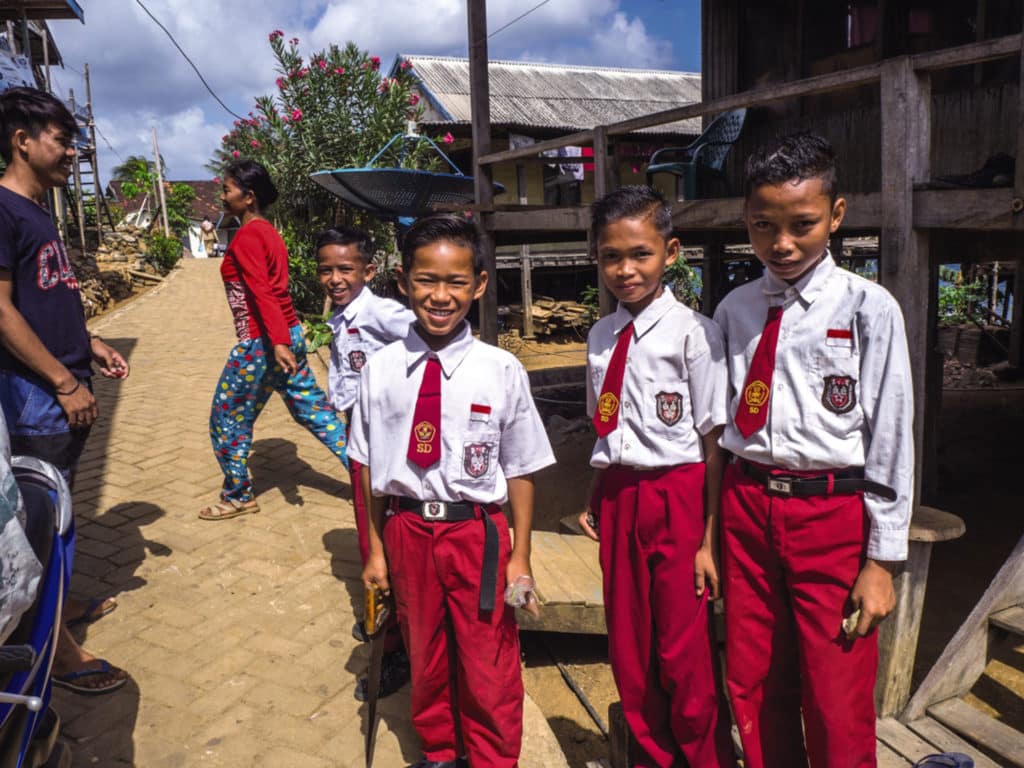
On Matasirih, basically everyone fishes to stay alive. A few female entrepreneurs place canned goods with a price tag in the dirt outside their door when the crew of fishing vessels from other islands visit. One hardworking fellow ships in a 55-gallon drum of diesel fuel on a barge that he then laboriously rolls up the rocky beach once a month or so.
Our favorite craftsman, smithy and machinist made lovely handcrafted knives from broken wrenches (high-carbon steel) that he collected from passing vessels.
Yes, I brought my guitar to town and played at the school. “Hit the Road Jack” was their favorite, and it seemed as though the whole village would start singing the chorus the moment we stepped into our dinghy to come ashore.
But we also learned to be cautious when dealing with youngsters, who rarely see Western visitors. A couple of times we spoke to young ladies who immediately froze under their headscarves, bug-eyed, then screamed in panic, and finally went running into the bush as if chased by Satan.
RELATED: On Watch: The Two Cover Girls of Borneo
In this part of the world, rice, eating, hospitality, politeness and friendship are all interwoven to the point where many people you encounter ask, “Have you eaten any rice today?” rather than offer a mere hello. Everywhere we went on the island, we were offered food. Even if the family had only one small cooked fish, the husband or father would imperiously demand an additional two plates as we hove into view.
Obviously, as good visitors, we needed to be aware of this. We didn’t want to bankrupt our hosts. So, in a sense, we began to engage in a sort of reverse bartering: The more they gave us, the more we gave them. Carolyn brought trash bags filled with hot popcorn to the schools and playgrounds. Each time we went ashore, she baked a cake and brought a cake knife along so we could slice as needed, depending on how many hospitality visits we partook in.
We always buy fishhooks wholesale by the kilo while passing through Australia. Each hook is worth its weight in gold on the outer isles of Indonesia.
In many ways, being ashore on Matasirih was like being in a time machine, only we could return to the present at any time, with our proud ketch-rigged yacht and its fluttering Stars and Stripes anchored just offshore.
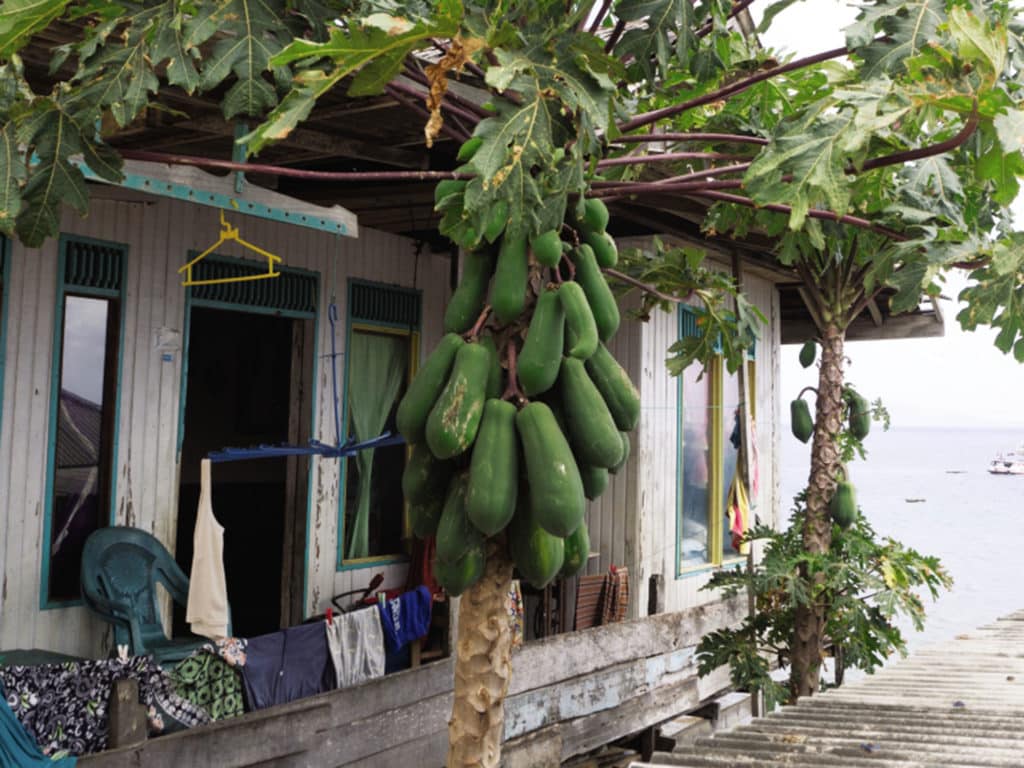
And speaking of Ganesh, we couldn’t let the hospitality flow in only one direction. These people were welcoming us into their homes, their hearths and their hearts; we couldn’t fail to reciprocate. And, hey, the beach was littered with dugout (and I mean dug out using hot coals) canoes.
So, we had an open house (open vessel?) aboard, during which our guests could peer into our private quarters just as we had theirs.
Did this require a bit of thought and planning? Yes, it did. I made sure no irresistible items like Swiss Army knives, can openers and small tools were left in plain sight to tempt the youngsters. While Carolyn remained in the cockpit to entertain the larger group with food and laughter, I’d take individuals or couples down below for a guided tour. Yes, the men were agog at my tool room, and the women were amazed at the compactness of Carolyn’s tiny galley. Visiting seaman were astounded by the efficiency of our anti-roll flopper stoppers, and now understood why we’d kept our flat-cut, fully battened mizzen hoisted to keep the boat’s nose into the wind.
In essence, we became people rather than strangers to one another. We had millions of things in common and only a few at variance. Yes, their culture is older (their ancestors immigrated 4,500 years ago from Taiwan) and in many ways more refined than mine. But we both want the same thing for our children: peace and prosperity.
I now knew in my heart and soul that they wished me well, and after having visited Ganesh, they then knew I wished them well in exactly the same way. We were friends.
And friendship is no small thing in a world increasingly divided.
Cap’n Fatty Goodlander and his wife, Carolyn, are riding out the current global storm aboard their ketch, Ganesh, in Singapore.

